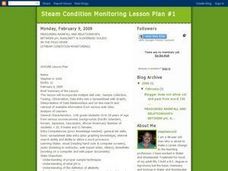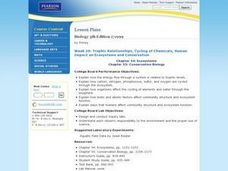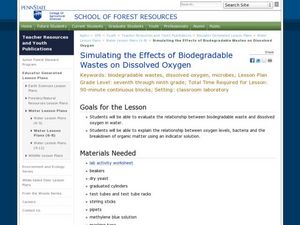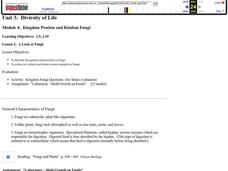Curated OER
Ecology of the Dump
Students determine which types of garbage are biodegradable and which are nonbiodegradable. They practice measuring skills, hypothesizing, taking data, and writing a lab report. Students observe the relative biodegradability of metal,...
Curated OER
Anatomy and Physiology "Quickies"
Students use a variety of creative writing tools within this assignment: poems on particular organ systems, write a short story and/or create a word graph. They are involved in a demonstration of lactic build up in the muscles, a...
Curated OER
Measuring Rainfall and Relationships Between pH, Alkalinity and Suspended Solids in the Pago River
Eleventh graders test the pH and alkalinity of Pago River. In this ecology lesson plan, 11th graders collect data and use spreadsheet to graph results. They analyze and share their findings with the class.
Curated OER
Seed Dispersion of Strawberries and Dandelions
Learners investigate how seeds are dispersed on land. In this plant biology lesson, students use a dissecting microscope to study strawberry seeds and dandelion seeds, they draw what they see, then create a hypothesis on the seeds...
Curated OER
The Challenge to Deliver Insulin
Young scholars study the types of diabetes and why insulin is important. In this diabetes lesson plan students build molecular models and create a healthy lifestyle plan.
Curated OER
Osmosis and the Cell Membrane-part 2
Students participate in a review of diffusion and the basic properties of the cell membrane before exploring the process of osmosis in a lab activity. Using shell-less eggs that have soaked in various solutions, students make...
Curated OER
Discovering Mitosis in Onion Roots
Learners discover the different stages of mitosis by examining onion roots under a microscope, drawing diagrams of what they see, and organizing collected data in a chart and create a pie graph from their lab data.
Curated OER
Saving Big Cats from Extinction
Students explore extinction. In this biology and environmental science lesson, students define extinction, identify what living things need to survive, and create a persuasive poster about "saving the big cats" using a desktop...
Serendip
Genetic Engineering Challenge – How Can Scientists Develop a Type of Rice That Could Prevent Vitamin A Deficiency?
Brown rice contains vitamins B and E, while white rice lasts longer in storage. The availability of rice around the world makes it a great candidate for genetic engineering. Scholars apply their knowledge of genetic engineering to solve...
Teach Engineering
The Keepers of the Gate Challenge
Help your class make a connection between salt water and nanoscience. In the introductory lesson of a seven-part unit, the class explores why salt water helps a sore throat feel better. Pupils conduct preliminary research about the...
Curated OER
Study of the Cell
Students draw a diagram to show the fluid mosaic model of a membrane. They explain how hydrophobic and hydrophilic properties help membranes hold their shape. They identify the functions of different cell membrane proteins as well.
Curated OER
What a Fungi
Seventh graders perform an experiment to determine the best growing conditions for molds. In this life science lesson, 7th graders explain where molds are commonly found. They collect data and draw diagrams of their observations.
Curated OER
Allelopathy Experiments
Students explore how allelopathy works in plants. In this botany lesson, students explain how this phenomenon affect other organisms. They read and analyze an article about allelopathy and discuss its flaws.
Curated OER
GPS Ecosystem (Ecotone) Scavenger Hunt
Students describe the characteristics of an ecotone. In this ecotone instructional activity, students pick out their area and describe the visual appearance, conditions, ecosystem, biodiversity, predators, prey, and trees in their...
Curated OER
Studying Living Organisms
Students discover and discuss the differences between prokaryotes and eukaryotes. Using a microscope, they examine various prepared slides of prokaryotic and eukaryotic organisms.
Curated OER
Biology: Howler Monkeys Tell All
Learners examine a PBS special about howler monkeys as an introduction to scientific forensic investigative methods. In groups, they conduct a host of experiments containing clues which point to discovery. By challenging assumptions,...
Curated OER
Trophic Relationships, Cycling of Chemicals, Human Impact on Ecosystems and Conservation
Learners explore how the energy flow through a system is related to trophic levels. They investigate how organisms affect the cycling of elements and water through the biosphere. Students participate in lab activities to observe ways...
Curated OER
Gene Regulation Mechanisms
Students explore genetics. They discuss how chromosomes and/or genes are regulated during the life of an organism. In a lab setting, students compare and contrast the genomic regulation of prokaryotic and eukaryotic cells using...
Curated OER
Enzyme Activity: An Inquiry Based Approach
Using an inquiry approach to studying biochemical reactions, cooperative teams of students investigate hypotheses about living materials that contain enzymes which break down in hydrogen peroxide. They perform experiments, practice...
Curated OER
Applied Evolution: How Will We Get There from Here?
Students explore the basic process of natural selection and how people can manipulate that process today. The consequences of natural selection on daily life and the implications of evolutionary biology in basic and applied science is...
Curated OER
Simulating the Effects of Biodegradable Wastes on Dissolved Oxygen
Students evaluate the relationship between biodegradable waste and dissolved oxygen in water. In this biodegradable wastes lesson students complete a lab activity in groups then analyze their results.
Curated OER
Diversity of Life
Students study fungi and its characteristics. For this fungi lesson students collect and observe fungi then answer questions on what they saw.
Curated OER
Dissect with Respect
Students, through exercises and discussions, examine ethics involved in the process of choosing and using laboratory animals, respect for the animal they dissect and how to behave in an ethical manner as they dissect various lab specimens.
Curated OER
Simulation of Gene Splicing
Students simulate gene splicing by examining bacteria. They create a bacterial DNA into which they insert the human DNA (gene) that codes for growth hormone. They cut the sites of the enzyme to study how the human DNA can be joined to...

























